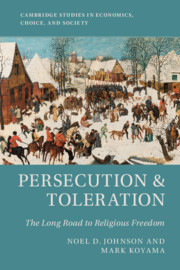Book contents
- Frontmatter
- Contents
- List of Figures
- List of Tables
- Preface
- Acknowledgments
- 1 Toleration, Persecution, and State Capacity
- I Conditional Toleration
- II The Origins Of Religious Freedom
- III Implications Of Greater Religious Liberty
- 11 The Persecution of Witchcraft
- 12 Religious Minorities and Economic Growth
- 13 The Emergence of Modern States, Religious Freedom, and Modern Economic Growth
- 14 Applying Our Argument to the Rest of theWorld
- 15 Modern States, Liberalism, and Religious Freedom
- 16 Conclusions
- Bibliography
- Index
11 - The Persecution of Witchcraft
from III - Implications Of Greater Religious Liberty
Published online by Cambridge University Press: 18 February 2019
- Frontmatter
- Contents
- List of Figures
- List of Tables
- Preface
- Acknowledgments
- 1 Toleration, Persecution, and State Capacity
- I Conditional Toleration
- II The Origins Of Religious Freedom
- III Implications Of Greater Religious Liberty
- 11 The Persecution of Witchcraft
- 12 Religious Minorities and Economic Growth
- 13 The Emergence of Modern States, Religious Freedom, and Modern Economic Growth
- 14 Applying Our Argument to the Rest of theWorld
- 15 Modern States, Liberalism, and Religious Freedom
- 16 Conclusions
- Bibliography
- Index
Summary
Prolonged witch hunting is as good a barometer as any for measuring weakness in a state.
(Soman, 1989, 17)In 1670, a strange sight occurred repeatedly in the villages located at the base of the Pyrénées mountains in western France. A young weaver's apprentice named Bacqué could be seen in the middle of the village square – flanked by two agents of the local parlement, or, high court. While this, in itself, was not so strange – apprentices and agents of the court were not so rare – the actions of Bacqué and the villagers certainly were. The entire village would line up and file past the young weaver, and he would declare each villager either a “witch” or “not a witch,” for the local magistrates in the region of Pau were convinced that Bacqué had the “gift” of seeing into people's souls to determine if they were tainted by the devil. The court agents and Bacqué would do this for as many as 30 villages, in the process identifying 6,210 “witches” (Mandrou, 1979, 236).
What happened next illustrates how the rule of law emerged in a society that was steeped in superstitious belief and clung to identity rules at the local level, but that was increasingly ruled by governments committed to maintaining order. Louis XIV's minister, Colbert, heard of what was going on and decided that it could not stand. He had Bacqué arrested and thrown in the Bastille and commanded the local magistrates to cease their search for witches in the area. On what grounds did he do this? Colbert objected to the irregularity of the judicial proceedings and annulled the prosecutions while issuing a royal proclamation (edict) that ”… prevents the courts and averts the disorders that would be caused by a procedure so irregular that it would envelop the majority of the inhabitants of the aforementioned province, trouble the repose of families and violate the rules of justice” (Mandrou, 1979, 241). Colbert's objection to the violation of the “rules of justice” was about as close to a proclamation in favor of the rule of law as one gets in early modern Europe.
- Type
- Chapter
- Information
- Persecution and TolerationThe Long Road to Religious Freedom, pp. 203 - 228Publisher: Cambridge University PressPrint publication year: 2019



